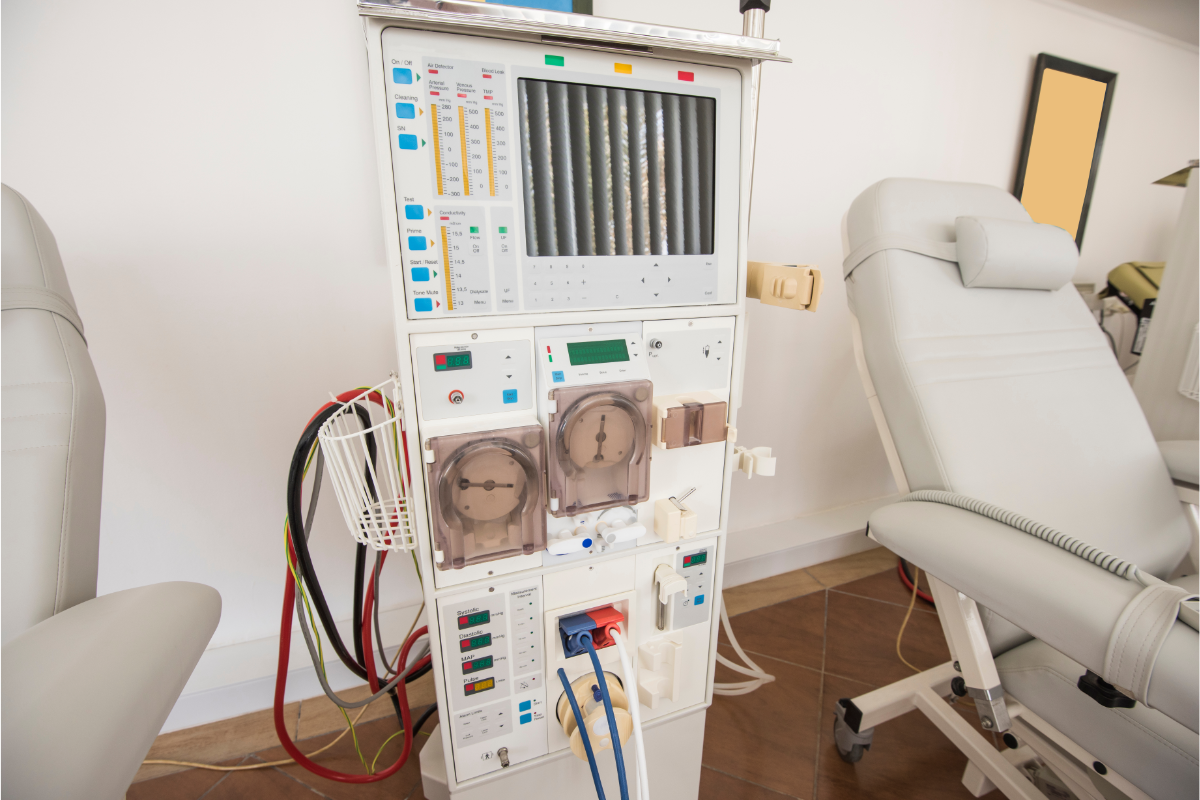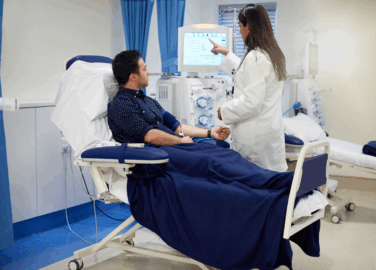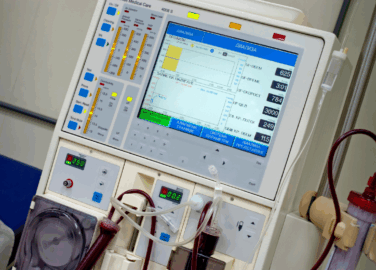Dialysis Centers Face Unique Waste Management Challenges
Dialysis centers face unique waste management challenges. The variety and risk level of the waste materials they generate every day complicate it. Apart from sharps and blood-soaked materials, dialysis centers generate chemical and pharmaceutical waste.
Correctly classifying each type of waste and storing it safely is a huge challenge. Another is ensuring proper treatment and disposal. Resolving these challenges is important to protecting staff and patients. They must be managed rigorously to meet regulatory standards and minimize environmental impact.
Why Dialysis Centers Need Specialized Waste Disposal
Dialysis centers produce a wide range of hazardous waste. That includes sharps, chemicals, biohazards, pharmaceuticals, and occasionally radioactive materials. Improper handling of these wastes can trigger serious legal and regulatory consequences.
That’s why MedPro helps dialysis centers with reliable medical waste disposal solutions. We provide:
Assistance with Regulatory Compliance
Dialysis centers must follow strict federal and state regulations from agencies like OSHA, EPA, and DOT.
These rules govern how they segregate, label, store, transport, and dispose of medical waste. Failing to comply can result in fines, legal penalties, or even facility shutdowns.
Efficient and Safe Waste Management and Disposal
Dialysis centers use specialized containers. They use reusable, locking, or tamper-resistant containers. These help prevent spills, accidents, and unauthorized access.
Training your staff to follow proper segregation and disposal protocols further improves safety. It keeps your dialysis operations running efficiently.
RMW and Biohazardous Waste Management
Dialysis centers produce different types of contaminated waste. They generated used dialyzers, blood-soaked gauze, bandages, and other materials.
These items may contain infectious agents that can spread disease. They need to be stored in secure, labeled biohazard containers. Dialysis centers also need to follow strict storage and disposal protocols to prevent exposure
Sharps Waste Management
Dialysis centers use needles, syringes, and other sharp medical tools. These sharps pose a high risk of needlestick injuries. Sharps can also expose your staff and patients to bloodborne pathogens. Your staff must dispose of all sharps in puncture-resistant containers. These containers will help prevent injuries and cross-contamination.
Chemical and Pharmaceutical Waste
Dialysis centers use medications such as erythropoietin and iron supplements. Any expired or unused pharmaceuticals must be disposed of properly. That helps prevent accidental ingestion, misuse, or environmental harm.
Dialysis centers also use disinfectants and cleaning agents. These hazardous chemicals also need safe handling and proper disposal.
Compliance Training for Public Health and Environmental Protection
Improper disposal of dialysis waste can expose your patients and staff to health risks. It also has a detrimental effect on public health and the environment. The right disposal methods can reduce these hazards.
Our Waste Management Solutions for Dialysis Centers
Dialysis centers face daily waste disposal demands that require specialised, compliant handling. MedPro Disposal understands the unique needs of your dialysis center. We can help you manage your waste safely, efficiently, and affordably.
- We will review your current waste management practices. Then, we will identify solutions to streamline them for your clinic. Operating multiple dialysis centers? We’ve got you covered.
- We support ongoing compliance with tailored staff training. Our courses help reinforce safe handling and disposal protocols specific to dialysis care.
- We manage all categories of dialysis-related waste. We use approved treatment methods, including autoclaving, chemical disinfection, and incineration.
- We deliver reliable, cost-predictable RMW disposal services. We provide highly responsive client support and industry expertise.

Why Dialysis Centers Choose MedPro Disposal
Dialysis centers rely on MedPro Disposal for consistent, compliant medical waste management. MedPro offers nationwide coverage, flat-rate pricing, and one-on-one client support. We also provide HIPAA- and OSHA-compliant training to hospital-based and independent dialysis centers. Our courses help your staff stay current on safe waste handling practices.
Nationwide Coverage for Dialysis Centers
We serve both stand-alone and hospital-affiliated dialysis sites across the 48 contiguous states.
Predictable
Pricing
Transparent, consistent billing with no hidden fees.
HIPAA & OSHA Training Support
Help your staff stay compliant with on-demand regulatory training courses.
Fast Start, Flexible Service
Your first pickup is scheduled within 7–10 business days after signing. Then, you can choose pickup frequencies that match your waste volume and workflow.
Full Access to the Client Portal
Manage documents such as manifests, training certificates, and invoices all in one place, anytime.
$33M Insurance Protection
We take full title of your waste at pickup, backed by $33 million in insurance coverage. This liability coverage safeguards your dialysis center throughout the handling, transport, and disposal of your medical waste.
Dialysis Centers We Serve
Dialysis centers may be hospital-based or operate independently as outpatient clinics. Both deliver specialized care and treatment types. Most offer two or all three treatment types: in-center hemodialysis, home hemodialysis, and peritoneal dialysis.
They have teams that often include nephrologists, nurses, dietitians, and social workers. These professionals help patients manage health needs and make critical lifestyle adjustments.
Hospital-based dialysis centers. These are ideal for patients requiring immediate access to integrated hospital care. Hospital-based dialysis centers also provide temporary dialysis for short-term treatments. Leading healthcare systems like the Mayo Clinic, DaVita, Fresenius Medical Care, and UCSF operate dialysis centers.
Independent (freestanding) dialysis centers. These offer accessible, cost-effective care for stable patients. Independent dialysis centers help expand treatment options to more regions in the US. Research suggests that independent dialysis centers typically serve patients with lower mortality risks.


Client Testimonial
“I am extremely happy with the service and transparency from this company. The rep who helped me was named Will. He was awesome and literally went above and beyond to make sure my schedule was addressed for the pick up. Super happy, and he made it very easy. I appreciate you guys!!!!”
– Michael J.
“They are fast, efficient, professional, and very kind. They will go out of their way to make sure your materials are taken care of so that you never have to worry when working with them! If I could give them 10 stars, I would!”
– Kimberly B.
“We’ve been using MedPro services for over a year now, and they have been fantastic at handling our sharps and hazardous materials. Their team is professional, reliable, and always ensures our waste is managed safely and efficiently. We’ve had a great experience working with them and will continue to do business with them for the foreseeable future. Highly recommend!”
– Kristie C.
Frequently Asked Questions
Industries We Serve

HOSPITALS
From smaller community hospitals to 100+ bed facilities, we offer solutions to meet your needs.

PHYSICIAN PRACTICES
Urgent care clinics have increased, we’ve grown our operations to provide an alternative solution.
Let’s Simplify Your Dialysis Center Waste Management
Stay compliant, reduce costs, and protect your staff and patients with MedPro’s waste disposal services. Get started today with a free, no-obligation quote.







